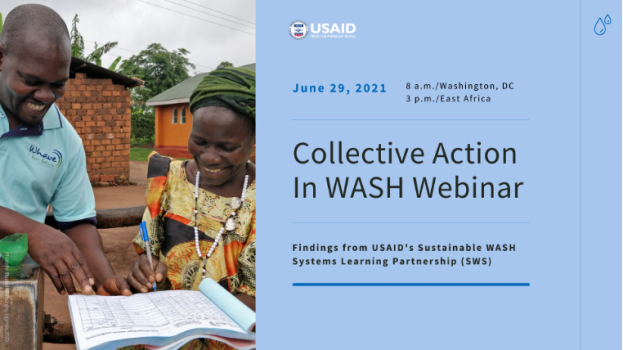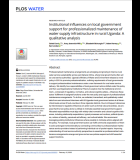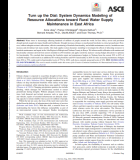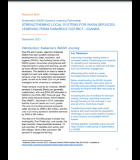Collective Action in WASH: Findings from SWS

|
June 29, 2021 |
The international water, sanitation, and hygiene (WASH) sector is increasingly looking to systems approaches to build sustainable services. Many partners are applying collaborative approaches to build strong and consistent local WASH systems.
After nearly four years of intensive research on the use of collective action in WASH, the Sustainable WASH Systems Learning Partnership (SWS) will share lessons and findings with the WASH community and gather your insights.
The research is based on extensive data collection and synthesis of 11 case studies. Findings include recommendations related to:
- The starting point for collaboration: Does problem identification need to involve all stakeholders or can existing solutions be demonstrated or applied?
- The structure of the hub: When should government host versus a support organization?
- The role of local government: What worked and what didn’t In terms of building and maintaining government support?
Join SWS practitioners for an overview of results and insights, approaches taken, and a robust Q&A and discussion on the findings.
Presenters:
- Muhammed Ebrahim Mussa, IRC/Tetra Tech
Muhammed Ebrahim is a Systems-Change Advisor for SWS in Ethiopia, working closely with IRC WASH and Tetra Tech since April 2018 in several program locations. He has more than 16 years of experience working in different government sectors and NGOs as an environmental health technician, assistant lecturer, senior sanitation specialist, and systems-change advisor.
- Cliff Nyaga, University of Oxford
Cliff Nyaga is a WASH Systems researcher with SWS partner, University of Oxford, and the Director of FundiFix, a Kenya-based organization that provides rural communities with sustainable water supply infrastructure and repairs. Cliff has 9 years of experience in urban and rural water services delivery in Kenya.
- Shawn Peabody, Environmental Incentives
Shawn Peabody leads the SWS research area on collective action. Since 2014 he has worked as a Senior Learning Specialist at Environmental Incentives. At EI, he supports client teams to develop and implement collaborative learning efforts to improve organizational effectiveness.
- Kimberly Pugel, University of Colorado Boulder
Kimberly Pugel is the primary researcher for the SWS research area on collective action. She is a Civil Engineering PhD Candidate at the University of Colorado, Boulder.
- Martin Watsisi, IRC Uganda
Martin Watsisi is currently the Regional WASH Advisor for IRC Uganda. He has more than 10 years of professional experience implementing participatory approaches in all phases of development initiatives. His experience in the rural water sector focuses on building coalitions and learning alliances to influence WASH sector change and sustainability
Please find the webinar slides here.





